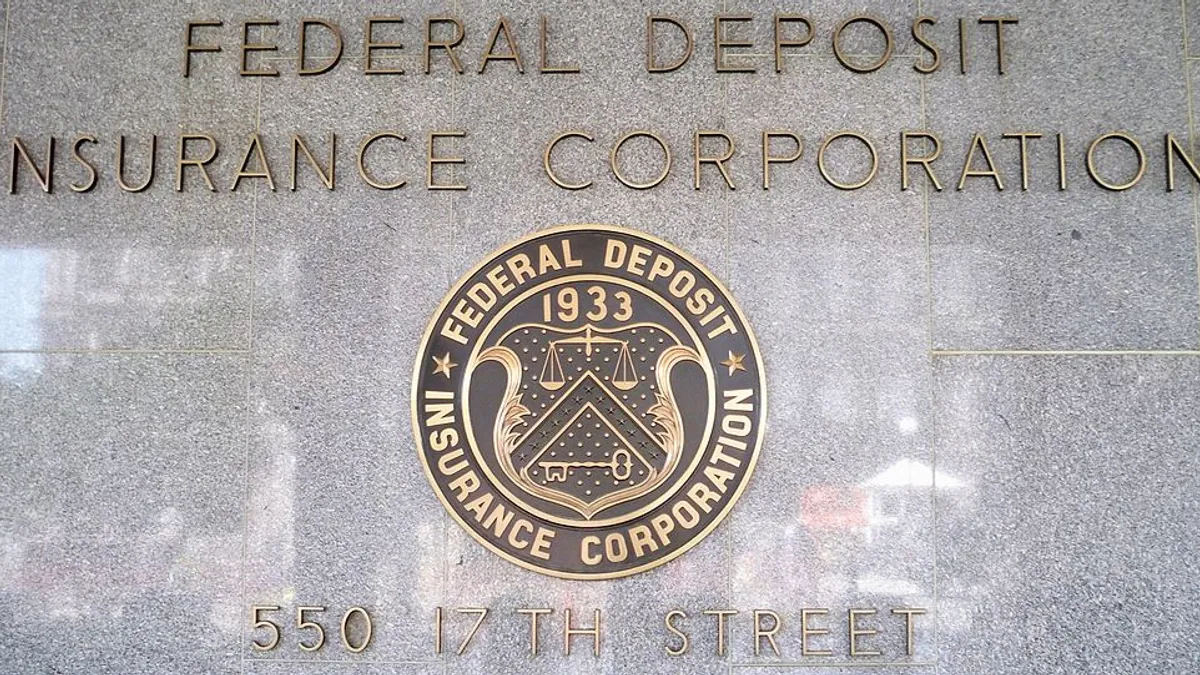Dive Brief:
-
The FDIC issued a final rule Tuesday regarding industrial loan company (ILC) charters, a move ILC opponents argue eases the path for commercial companies to operate as banks without Federal Reserve oversight.
-
FDIC Chair Jelena McWilliams said the final rule provides "transparency to market participants regarding the FDIC's minimum expectations for parent companies of industrial banks," and codifies existing practices utilized by the agency to supervise ILCs and their parent companies.
- The move comes as a growing number of nonbanks, including investment company Edward Jones and e-commerce giant Rakuten, have applied for ILC charters over the past several months.
Dive Insight:
The final rule requires ILC parent companies to enter into a written agreement with the agency on capital and liquidity levels, and pledge to maintain "the industrial bank's capital and liquidity at levels that the FDIC deems necessary for the safe and sound operation of the industrial bank."
The FDIC said it first sought public input for the ILC proposal in March given the continuing interest in ILCs.
The agency said it has received 12 deposit insurance applications from proposed ILCs since 2012. Of those, two have been approved, eight have been withdrawn and two are pending, the FDIC said.
GM's lending arm, General Motors Financial Company, submitted its application for an ILC charter last week.
The ILC charter has long been a target for traditional banks and lawmakers who argue the designation exploits a loophole by exempting ILCs from the definition of a "bank" under the Bank Holding Company Act.
Sen. John Kennedy, R-LA, introduced a bill last year aimed at closing a "loophole" that allows ILCs to bypass oversight by the Federal Reserve.
"The Rakutens and the Googles of the world shouldn't be able to circumvent the Fed," Kennedy said at the time. "If they're allowed to handle your banking services, they're going to turn into continents."
Following the FDIC's approvals of fintech Square and student loan servicer Nelnet's ILC applications in March, Sen. Sherrod Brown of Ohio, the top Democrat on the Senate Banking Committee, accused McWilliams of shuffling corporate favors "through the side door" amid the pandemic.
"Just before the last crisis, regulators gutted financial rules and even considered letting megacorporations like Walmart own banks — and here we go again," he said in a statement.
Independent Community Bankers of America (ICBA) President and CEO Rebeca Romero Rainey spoke out against the FDIC's final rule Tuesday, calling ILCs "the fashionable charter of choice for companies seeking to benefit from the federal safety net while avoiding oversight."
"Commercial firms should not be permitted to own a bank or ILC even if it is subject to enhanced supervision and regulation, which violates the longstanding separation of banking and commerce and leaves dangerous gaps in oversight," she said in a statement.
Martin Gruenberg, who was the four-member FDIC board's lone dissenter on the ruling, said the final rule makes two changes to March's notice of proposed rulemaking that "significantly weaken the requirements of the rule."
The FDIC's original proposal would have required each parent company to commit to limiting its representation on the ILC's board of directors to 25%. But the final rule revises that proportion to 50%, Gruenberg said.
Gruenberg also noted that after three years, ILCs wouldn't need the FDIC's prior approval to add or replace a senior executive officer or a member of its board of directors. Prior guidance didn't include that time limit, he said.














